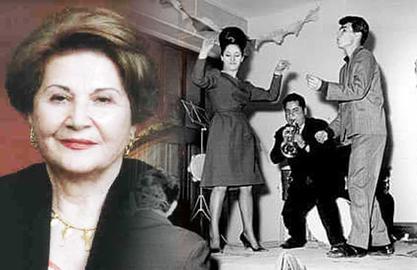Global and Iranian history are both closely intertwined with the lives and destinies of prominent figures. Every one of them has laid a brick on history’s wall, sometimes paying the price with their lives, men and women alike. Women have been especially influential in the last 200 years, writing much of contemporary Iranian history.
In Iran, women have increased public awareness about gender discrimination, raised the profile of and improved women’s rights, fought for literacy among women, and promoted the social status of women by counteracting religious pressures, participating in scientific projects, being involved in politics, influencing music, cinema... And so the list goes on.
This series aims to celebrate these renowned and respected Iranian women. They are women who represent the millions of women that influence their families and societies on a daily basis. Not all of the people profiled in the series are endorsed by IranWire, but their influence and impact cannot be overlooked. These articles are biographical stories that consider the lives of influential women in Iran.
IranWire readers are invited to send in suggestions for how we might expand the series. Contact IranWire via email ([email protected]), on Facebook, or by tweeting us.
Parvin Motamed was born in 1927 to a Jewish family in the city of Hamedan. Her father, a descendent of Mullah Yehuda Rian, a prominent rabbi in Iran’s Jewish community, was a well-known landowner in the city.
Parvin Motamed studied at Hamedan Alliance School, which was later renamed Etehad School. Alliance schools were a group of pioneering educational establishments owned and run by Iranian Jews, and there were branches in Tehran and 13 other cities, including Hamedan, Isfahan, Shiraz, Khorramabad, Kashan, and Borujerd. They were known for their high educational standards and the great attention they paid to ensure their students had the most up-to-date science education, as well as for their emphasis on teaching French and English languages.
Motamed had two years of high school to complete when her family moved to Tehran. She married Loghman Amini soon after and completed her diploma at Hadaf High School, founded by Ahmad Birashk, a famous mathematician who set up several schools at the time, together with his colleagues. As with the Alliance school, this high school was also known for being a progressive establishment at the time, but was closed down a year after the 1979 Islamic Revolution.
After Motamed obtained her diploma, she went to Tehran University to study English Literature. At the same time, she began teaching part-time at the ORT School — the Association for the Promotion of Skilled Trades — a global education network run by Jewish communities. It was the beginning of a career path that she has remained committed to throughout her life.
ORT was initially set up in St Petersburg in Russia to help poor Jewish communities acquire skills to improve their employment prospects. Founded by Nikolai Bakst, Samuel Poliakov, and Baron Horace Gunzbur, the organization eventually became international, and training and vocational schools were set up around the world. The first school was opened in the Jewish community in Palestine, and when the state of Israel was established, the organization played a key role in shaping education there. Over 100 schools were eventually opened around the world.
The first ORT School in Iran was founded in 1960 in Damavand Street, Tehran, with schools later being opened in Shiraz and Isfahan.
In 1968, after teaching at the girls’ school, Motamed was appointed as its headmistress. At the same time, she took evening courses at university to further her own education, eventually obtaining a Master's degree in psychology. Because she had trained to teach in vocational schools at the ORT Center in Switzerland and had gained such extensive practical experience, she was regarded as the most qualified person to be director of the World ORT organization.
Under Motamed’s leadership, the school made a number of progressive achievements, and became well known for producing the best technical and vocational graduates in the Iranian labor market. The school received international acclaim, and students from other Asian countries came to Iran to study there.
After continued perseverance, Motamed persuaded the Ministry of Science and Higher Education to allow ORT to offer post-graduate degrees to its students, beginning in 1973. She was also granted a contract to train technical and vocational teachers to teach in other high schools in the country.
The educational institute remained active until just after the revolution in 1979, after which Motamed moved to Switzerland and later to London. A few weeks after she left Iran, the entire organization — which by then was extensive — was shut down. Under the supervision of the Ministry of Science, the school was re-named Shamsipur Technical College. This was a blow for Motamed, who had so worked hard to build up ORT and promote its ideals.
As a gesture of gratitude for her invaluable service in Iran, Motamed was elected to be one of five members of the ORT’s board of directors.
Fluent in both French and English, and familiar with Arabic, Spanish, Turkish, and Hebrew, Motamed participated in numerous lectures and conferences around the world.
She was asked to travel to the United States as the head of the World Committee of ORT to help make the necessary preparations for the institution’s expansion in New York.
After her role in setting up the New York ORT college, she went on to help the establishment of the Chicago and Los Angeles ORT Colleges. She retired in 1998 after nearly half a century of hard work. Since then, she has worked part-time as a senior consultant for the World ORT Institute.
Read other articles in the series:
Dr. Mina Izadyar, a Zoroastrian Doctor at the Service of All Iranians
Iranian Women You Should Know: Maryam Khatoon Molkara
Iranian Women You Should Know: First Female Coal Miner
Iranian Women You Should Know: Gohar Eshghi
visit the accountability section
In this section of Iran Wire, you can contact the officials and launch your campaign for various problems


























comments